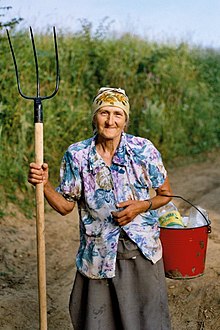Farmer: Difference between revisions
m Reverted edits by 68.221.136.162 to last revision by ClueBot (HG) |
No edit summary Tag: references removed |
||
| Line 4: | Line 4: | ||
== Definition == |
== Definition == |
||
so i was in an epic battle between me and the spetsnaz and i whipped out my RPG and blew them away luckily i had scavenger so i didnt run out of ammo |
|||
The term ''farmer'' usually applies to a person who grows field [[crops]], and/or manages [[orchard]]s or [[vineyard]]s, or raises [[livestock]] or [[poultry]] such as chicken and cows. Their products are usually sold in a [[market]] or, in a subsistence economy, consumed by the family or pooled by the community. |
|||
In some countries, a farmer engaged in raising cattle, horses, or sheep for profit is usually referred to as a [[Ranching|''rancher'']] (U.S.), ''[[wikt:grazier|grazier]]'' (Australia) or ''stockman''. Special terms also apply to other people who [[Animal husbandry|husband]] domesticated animals, namely ''[[shepherd]]'' for [[Domestic sheep|sheep]] farmers and ''[[goatherd]]'' for [[goat]] farmers. The term ''[[dairy]] farmer'' is applied to those engaged in milk production. A ''[[poultry]] farmer'' is one who concentrates on raising [[chicken]]s, [[Turkey (bird)|turkeys]], [[Domestication|domesticated]] [[duck]]s and [[goose|geese]], or is involved in [[Egg (food)|egg]] production. A person who raises a variety of vegetables for market may be called a ''truck farmer'' or ''market gardener''. A ''dirt farmer'' is an American term for a practical farmer, or one who farms his own land.<ref>Oxford English Dictionary</ref> |
|||
In the context of [[developing nation]]s or other pre-industrial cultures, most farmers practice a meager [[subsistence agriculture]]—a simple [[organic farming]] system employing [[crop rotation]], [[saved seed]], [[slash and burn]] or other techniques to maximize efficiency while meeting the needs of the household or community. In [[developed nation]]s however, a person using such techniques on small patches of land might be called a [[gardener]] and be considered a [[hobbyist]]. Alternatively, one may be driven into such methods by [[poverty]] or, ironically—against the background of large-scale agribusiness--may become an organic farmer growing for discerning consumers in the [[local food]] market. Historically, one subsisting in this way may have been known as a ''[[peasant]]''. |
In the context of [[developing nation]]s or other pre-industrial cultures, most farmers practice a meager [[subsistence agriculture]]—a simple [[organic farming]] system employing [[crop rotation]], [[saved seed]], [[slash and burn]] or other techniques to maximize efficiency while meeting the needs of the household or community. In [[developed nation]]s however, a person using such techniques on small patches of land might be called a [[gardener]] and be considered a [[hobbyist]]. Alternatively, one may be driven into such methods by [[poverty]] or, ironically—against the background of large-scale agribusiness--may become an organic farmer growing for discerning consumers in the [[local food]] market. Historically, one subsisting in this way may have been known as a ''[[peasant]]''. |
||
Revision as of 14:04, 14 April 2010

A farmer is a person who raises living organisms for food or raw materials.
Definition
so i was in an epic battle between me and the spetsnaz and i whipped out my RPG and blew them away luckily i had scavenger so i didnt run out of ammo
In the context of developing nations or other pre-industrial cultures, most farmers practice a meager subsistence agriculture—a simple organic farming system employing crop rotation, saved seed, slash and burn or other techniques to maximize efficiency while meeting the needs of the household or community. In developed nations however, a person using such techniques on small patches of land might be called a gardener and be considered a hobbyist. Alternatively, one may be driven into such methods by poverty or, ironically—against the background of large-scale agribusiness--may become an organic farmer growing for discerning consumers in the local food market. Historically, one subsisting in this way may have been known as a peasant.

In developed nations, a farmer (as a profession) is usually defined as someone with an ownership interest in crops or livestock, and who provides land or management in their production. Those who provide only labor are most often called farmhands. Alternatively, growers who manage farmland for an absentee landowner, sharing the harvest (or its profits) are known as sharecroppers or sharefarmers. In the context of agribusiness, a farmer can be almost anyone – and can legally qualify under agricultural policy for various subsidies, incentives, and tax relief.
Farmers are often members of local, regional or national farmers' unions or agricultural producers' organizations and can exert significant political influence. The Grange movement in the United States was effective in advancing farmer's agenda, especially in the early 20th century against the railroads and agribusiness interests. The FNSEA is very politically active in France, especially on the genetically modified food issue. Agricultural producers small and large are represented globally through the International Federation of Agriculture Producers (IFAP), representing over 600 million farmers through 120 national farmers' unions in 79 countries.[1]
See also
- Agriculture
- Agribusiness
- Agroecology
- Gardening
- Landed gentry
- Organic farming
- Pastoralism
- Peasant
- Sustainable agriculture
